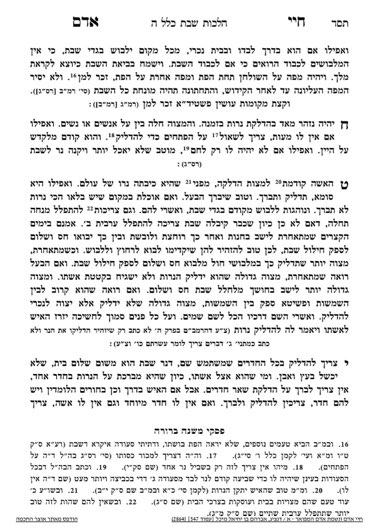We are beginning siman 10. We have learned the background to the siman over the past few shiruim, and today we will begin it inside.
The Chayei Adam writes that one has a chiyuv to light in all rooms which they will be using over Shabbos. If there is a room which they do not plan to enter, or which they will only enter when there is sufficient natural light, they do not have to light in there. As we have learned (S0128), one of the reasons why Chazal instituted neiros Shabbos is to avoid issues of shalom bayis from people getting hurt, so it is necessary to place light in any room where it will be needed.
If a person is home with his wife, since she makes a bracha in one room, there is no need to make a bracha in other rooms. The bracha she makes works throughout the house. Nowadays, we are yotzei this chiyuv with electric lights. A person must have light in the room itself, or light coming in from elsewhere which provides sufficient illumination. Thus, for example, one does not need to turn on a light in a child’s room if there is sufficient light entering from a hallway.
If the woman is not making a bracha on the candles for eating (for example, they are eating out), even though the idea of oneg does not apply, the concern for shalom bayis still applies. Therefore, a person would still light candles or oil in order to make a bracha on the illuminatiin that they turn on for the purpose of shalom bayis.
The Chayei Adam continues, and writes that if the husband is away from home, or when there are bochurim in yeshiva away from home, if they have a room, they light and make a bracha in that room, due to the chiyuv of shalom bayis. If a person does not have their own room, they still have a chovas haguf to light, even though they do not have a chovas bayis (S0134). If they are paying for their food, they are not considered subsumed under the host. It is in such a case that they are mishtateif b’perutah with the host.
When multiple men are staying in the same room, such as businessmen on their way to the fair, they should join together to cover the cost of neiros, and one person should light and have in mind to be motzi everyone. Those listening should have in mind to fulfill their obligation as well and to be yotzei with his bracha and say amein.
Summary
- One has a chiyuv to put lights on in any areas of the house which will need it over Shabbos.
- Once one family member makes a bracha in the home (in the place of achila), it covers other lights put on in the home as well, even by other family members. Even a bracha is not being made on the candles of mokom achila, one makes a bracha on neiros which are providing illumination for shalom bayis.
- If one is a guest over Shabbos, and they are eating their meals with their hosts, they are included in their host’s hadlakah.
- If they have their own room, they have a chiyuv to ensure there is sufficient light in their room, and would make a bracha on those lights.
- If one is a guest but is eating their own food, they are mishtateif b’perutah with the host.



